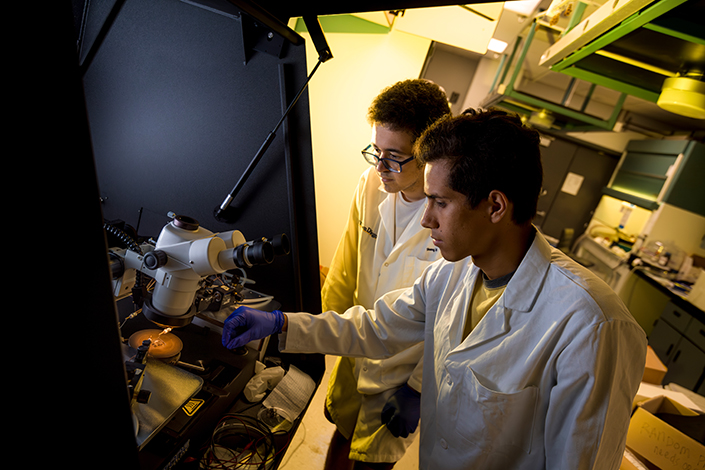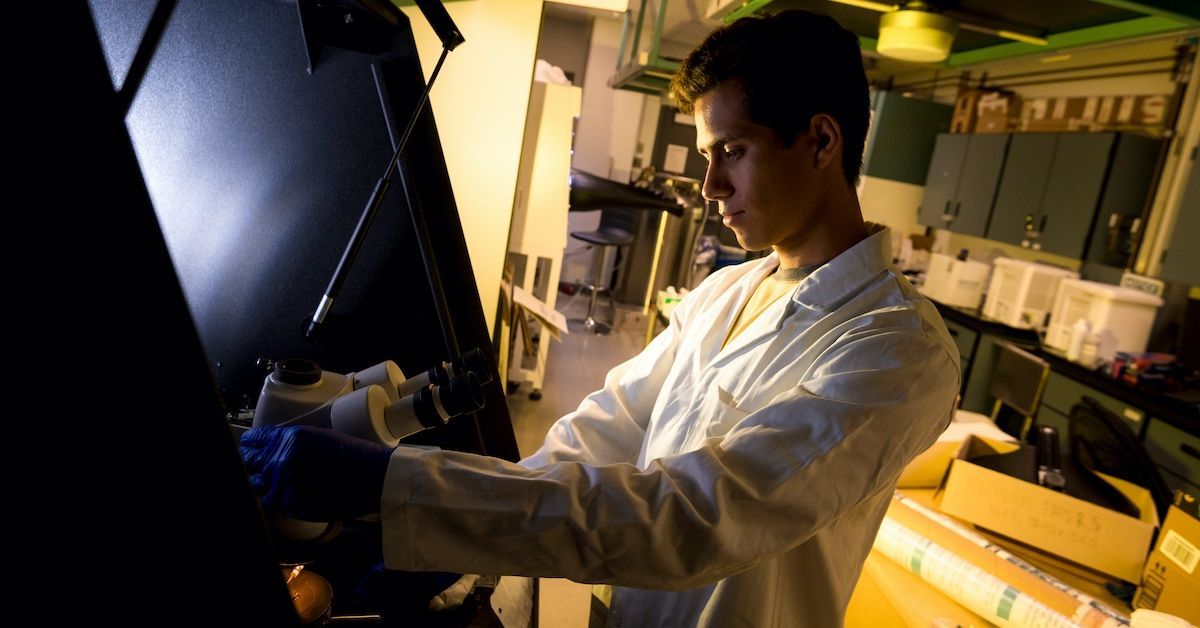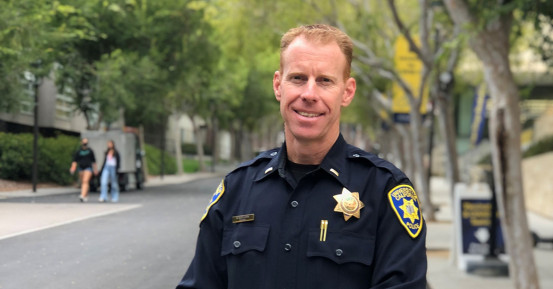UC San Diego Engineering Undergrads Get Hands-On Lab Experience in the Summertime
“GEAR to Career” offers added opportunities for engineering students to master core research skills
Story by:
Media contact:
Published Date
Story by:
Media contact:
Share This:
Article Content
The University of California San Diego’s Guided Engineering Apprenticeship in Research (GEAR) is a program designed to provide highly driven engineering undergraduate students with unique opportunities to immerse themselves in a research-intensive environment.
It runs through the academic year, and now continues into the summer, thanks to a gift from General Atomics and the dedicated commitment of mentors from the Jacobs School of Engineering and partner labs.
In 2020-21, during the worst of the worldwide COVID-19 pandemic, Isaac Perez, a chemical engineering major at UC San Diego, took all of his classes online. Although this was necessary at the time, it was a frustrating reality for a young man who, from his earliest memories, had craved hands-on experience in the laboratory.
“In school, science and math were the subjects that I was most interested in, that I most enjoyed and that I did the best in,” Perez said. “With some guidance from my parents, I figured that the field of engineering was perfect for me, since it involved the application of math and science to solve problems in the world. Projects in my engineering classes further captivated me, and I started thinking of ways to apply engineering through a humanitarian perspective. There are innumerable ways an engineer can improve the world, and I’m still in the process of figuring out my role.”
As soon as it was safe to reconvene in person, Perez channeled this ambition and curiosity into an application for GEAR.
“When I heard about GEAR and its purpose as an introduction to research, I knew that it was an exciting opportunity and seized it quickly,” said Perez. “I’m hoping that in the summer program, I might be able to work more independently and get a feel for how research questions are tackled from scratch.”
The summer program, known as GEAR to Career, gives students extra time in the lab to deepen their skills. GEAR is providing funding for 12 students to engage in research this summer.
The bonus lab time is funded in part by partnerships with General Atomics and Lawrence Livermore National Laboratory. Support from General Atomics helps dedicated students, including Jacinda Martinez, a GEAR to Career participant and student in bioengineering, overcome financial barriers and other challenges and dedicate themselves to their studies over the summer.
"Thanks to General Atomics and the GEAR Summer Research Scholarship, I have been able to focus completely on the research I am doing in my lab,” said Martinez. “It has been an eye-opening experience in that I have realized how much I enjoy research and would like to continue working in research in the future."
Coordinated by UC San Diego’s IDEA Engineering Student Center and based on the campus’ Computer Science and Engineering Early Scholars and Research program (ESRP), GEAR is structured to give second- and third-year engineering students an opportunity to build skills, confidence and connections in all the core elements of research. In the fall, all GEAR Research Apprentices take ENG 20: Introduction to Engineering Research, a two-unit course that provides a full orientation to engineering research and the opportunity to write a research plan.

“General Atomics is proud to support the GEAR program at the UC San Diego Jacobs School of Engineering and its mission to drive hands-on, industry-relevant engineering education for a diverse student population,” said Linden Blue, CEO of General Atomics Aeronautical Systems, Inc. “We believe that helping aspiring engineers to acquire research experience is a great way to introduce them to the limitless opportunities available to them from companies like General Atomics.”
This emphasis on direct experience makes Gear to Career a great fit for Perez, who has always focused on applying his skills and fascinations in real-world settings. He cites two major breakthroughs acquired during his time with GEAR: learning how to make a good presentation and how to maintain a research log.
“In presentations, I learned how to use images and gestures more than words on a poster or slide, and to convey the main idea in a shorter amount of time. I’ve gotten compliments about the way I explain things, and this program has helped me feel more comfortable with public speaking as a whole. With the research log, I’ve learned the best way to make sure it stays updated is to make it the first thing I open on my computer and the last thing I close at the end of my day. It has been extremely valuable to keep track of what my lab was doing on certain days and to explain why we chose to do or didn’t do certain activities. Overall, GEAR has not only introduced me to research and excited me with lab work, but has improved my organizational abilities as well.”
Students from the Jacobs School of Engineering’s bioengineering, electrical engineering, mechanical and aerospace engineering, nanoengineering and structural engineering departments are encouraged to apply for GEAR. (Computer science students can apply for the aforementioned, equivalent ESRP program.) The majority of participants have been first-generation college students and Pell Grant eligible, with a roughly even gender balance. Since it began in 2019, each cohort has shown marked growth in understanding of research methods and practices, according to before-and-after self-assessments.
Sergio Godinez, a GEAR Central Mentor who is pursuing a Ph.D. in structural engineering at UC San Diego, explains how GEAR is a unique product of the innovation-driven engineering environment at the Jacobs School.
“There are several components that are necessary for the program to be successful,” Godinez says. “The IDEA Engineering Center, which has the purpose of helping all the students of the Jacobs School of Engineering succeed, organizes the program and sets the structure. A diverse group of research labs voluntarily accept undergraduate students and provide mentors to the participants throughout the academic year. And, most importantly, it relies on engaged students willing to participate and improve in their young careers through research experience, who are found in abundance at UC San Diego.”
Since it was launched in 2019, GEAR has offered participants a comprehensive introduction to research, project assignments and mentorship from the IDEA Engineering Student Center, a chance to write research papers and participate in a poster presentation, and workshops and socials to discuss what they’ve learned and build a network. Meeting peers and experts, explaining his ideas in public and fostering “soft skills” have been invaluable for Perez, who intends to mix his engineering pedigree with his broad humanitarian interests.
“My experience with philosophy, which I have as a minor, has caused me to consider more than just morality, which was my primary interest,” Perez says. “Philosophy is a means to figure out the world as it extends beyond what we can figure out from the natural sciences, which is a concept I am still learning to appreciate about the field. I am aiming to be in an industry which has humanitarian goals or consequences. I’d like to make a career of helping people, where I can apply my skills and knowledge as a chemical engineer in a position which helps people, especially with their more fundamental needs.”
Share This:
You May Also Like
Stay in the Know
Keep up with all the latest from UC San Diego. Subscribe to the newsletter today.




